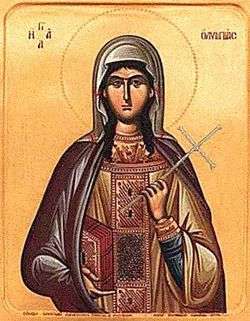Olympias the Deaconess
| Saint Olympias | |
|---|---|
 | |
| Deaconess | |
| Born |
circa 361–368 Antioch or Constantinople |
| Died |
July 25, 408 Nicomedia |
| Venerated in | Roman Catholic Church, Eastern Orthodox Church |
| Canonized | Pre-Congregation |
| Feast |
December 17, Roman Catholic July 25, Eastern Orthodox |
Olympias, also known as Saint Olympias and sometimes known as Olympias the Younger[1] to distinguish her from her aunt of the same name[2] (Greek: Ὀλυμπιάς, sometime between 361 and 368-July 25, 408) was a Christian Roman noblewoman of Greek descent.
Olympias was born and raised either in Constantinople or Antioch. She was the daughter born to the Antiochian Greek noblewoman, Alexandra and the wealthy Greek Rhetor, Seleucus.[3] Olympias had a sibling, who was a parent of Olympias and Seleucus.[4] Olympias was the namesake of her late paternal aunt Olympias who was once engaged to the Roman emperor Constans[5] who later married the Roman Client King of Arsacid Armenia Arsaces II (Arshak II).[6] The paternal grandfather of Olympias was Flavius Ablabius who had held consular rank in Constantinople,[7] while her maternal uncle was Calliopius the Rhetor who served as a grammaticus and assistant-teacher under the Rhetor, historian Libanius[8] and later served as a Roman official under the Roman emperors Constantius II and Julian the Apostate.
Olympias is described as the ‘beloved daughter’ born to Seleucus and Alexandra.[9] In her adult years, Olympias would later go to marry a nobleman called Nebridius who served as Prefect of Constantinople.[10] After her husband died and refusing many offers of marriage,[11] she dedicated her life to the church, serving (possibly in an ordained capacity) as a deaconess. She would later become a friend of Saint John Chrysostom.
Her good works included building a hospital, an orphanage and even looking after Monks who had been led in exile from Nitria. All of this even led to John Chrysostom telling her that she had done almost too much.[12] Her support for John Chrysostom led her to being exiled in 404, which resulted her in losing her house and living the rest of her life in exile at Nicomedia, where she would die on July 25, 408, after a long illness. Olympias is one of the 140 Colonnade saints which adorn Saint Peter's Square.
References
- ↑ Smith, A Dictionary of Christian Biography, Literature, Sects and Doctrines N to S Part Seven, p.73
- ↑ Moret, Sertorius, Libanios, iconographie: a propos de Sertorius, journée d'étude, Toulouse, 7 avril 2000 [suivi de] autour de Libanios, culture et société dans l'antiquité tardive : actes de la table ronde, Avignon, 27 avril 2000, p.207
- ↑ Jones, The Prosopography of the Later Roman Empire: Volume 1, AD 260-395, Parts 260-395, p.p.175&818
- ↑ Moret, Sertorius, Libanios, iconographie: a propos de Sertorius, journée d'étude, Toulouse, 7 avril 2000 [suivi de] autour de Libanios, culture et société dans l'antiquité tardive : actes de la table ronde, Avignon, 27 avril 2000, p.207
- ↑ De Imperatoribus Romanis - An Online Encyclopedia of Roman Emperors: Constans I (337-350 A.D.)
- ↑ Moret, Sertorius, Libanios, iconographie: a propos de Sertorius, journée d'étude, Toulouse, 7 avril 2000 [suivi de] autour de Libanios, culture et société dans l'antiquité tardive : actes de la table ronde, Avignon, 27 avril 2000, p.207
- ↑ Budge, Paradise of the Holy Fathers Part 1, p.163
- ↑ Jones, The Prosopography of the Later Roman Empire: Volume 1, AD 260-395, Parts 260-395, p.175
- ↑ Selected Letter of Libanius: From the Age of Constantius and Julian, p.194
- ↑ Catholic Online - St. Olympias
- ↑ New Advent Catholic Encyclopedia - St. Olympias
- ↑ Patron Saint Index - Saint Olympias
Sources
- Catholic Online - St. Olympias
- New Advent Catholic Encyclopedia - St. Olympias
- Patron Saint Index - Saint Olympias
- De Imperatoribus Romanis - An Online Encyclopedia of Roman Emperors: Constans I (337-350 A.D.)
- A.H.M. Jones, J.R. Martindale & J. Morris, The Prosopography of the Later Roman Empire: Volume 1, AD 260-395, Cambridge University Press, 1971
- P. Moret & B. Cabouret, Sertorius, Libanios, iconographie: a propos de Sertorius, journée d'étude, Toulouse, 7 avril 2000 [suivi de] autour de Libanios, culture et société dans l'antiquité tardive : actes de la table ronde, Avignon, 27 avril 2000, Presses Univ. du Mirail, 2003
- E.A. Wallis Budge, Paradise of the Holy Fathers Part 1, Kessinger Publishing, 2003
- W. Smith & H. Wace, A Dictionary of Christian Biography, Literature, Sects and Doctrines N to S Part Seven, Kessinger Publishing, 2004
- Selected Letters of Libanius: From the Age of Constantius and Julian, Liverpool University Press, 2004